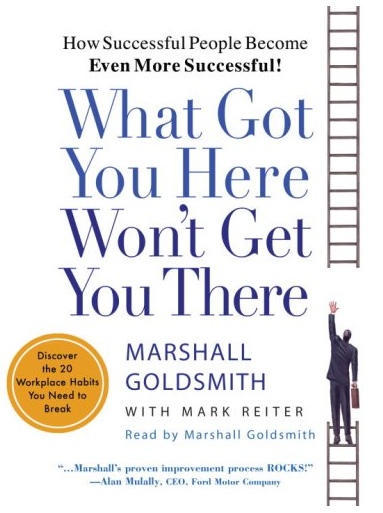This time of the year is by far the best moment to over promise on good intentions. As the saying goes: ‘The road to hell is paved with good intentions’. Cutting back on promises and refraining from making a new year’s resolution would be the safest thing to do right now.
However, I happen to be in the middle of a good book called ‘What Got You Here Won’t Get You There: How Successful People Become Even More Successful‘. The author is Marshall Goldsmith, a famous executive coach. I like this book so much that I decided to blog about it even before I finished it. And while I’m at it, I attach my new year’s resolution to it.
Let me explain.
Unlike any other book in the field of coaching, this one is pretty down to earth and it does not tell you what you should start doing. Instead, it tells you what to stop doing. The subtitle of the book says it all: ’20 workplace habits you need to break’. The practical, real world advice for conquering these bad habits is immensely useful. Here’s his list of bad habits:
- Winning too much: The need to win at all cost in all situations – when it matters, when it doesn’t, and when it’s totally beside the point.
- Adding too much value: The overwhelming desire to add our two cents to every discussion.
- Passing judgment: The need to rate others and impose our standards on them.
- Making destructive comments: The needless sarcasm and cutting remarks that we think make us sound sharp and witty.
- Starting with ‘no’, ‘But’, ‘However’: The overuse of these negative qualifiers which secretly say to everyone, “I’m right. You’re wrong”.
- Telling the world how smart we are: The need to show people we’re smarter than they think we are
- Speaking when angry: Using emotional volatility as a management tool.
- Negativity, or ”Let me explain why that won’t work”: The need to share our negative thoughts even when we were not asked.
- Withholding Information: The refusal to share information in order to maintain an advantage over others
- Failing to give proper recognition: The inability to praise and reward.
- Claiming credit we don’t deserve: The most annoying way to overestimate our contribution to any success.
- Making excuses: The need to reposition our annoying behavior as a permanent fixture so people excuse us for it.
- Clinging to the past: The need to deflect blame away from ourselves and onto events and people from our past; a subset of blaming everyone else.
- Playing favorites: Failing to see that we are treating someone unfairly.
- Refusing to express regret: The inability to take responsibility for our actions, admit we’re wrong, or recognize how our actions affect others
- Not listening: The most passive-aggressive form of disrespect for colleagues.
- Failing to express gratitude: The most basic form of bad manners.
- Punishing the messenger: The misguided need to attack the innocent who are usually only trying to help us.
- Passing the buck: The need to blame everyone but ourselves.
- An excessive need to be ‘me’: exalting our faults as virtues simply because they’re who we are.
The remainder of the book is very down-to-earth. Goldsmith warns against self-diagnosis, and so he does not dive into a sea of expensive management mumbo jumbo or intelligent psychobabble. Instead, he explains the benefits of simple things that all of us are capable of, such as: feedback, apologizing, listening and thanking. The kind of things you could explain to your grandmother, or even to the contrary: grandmother’s wisdom.



